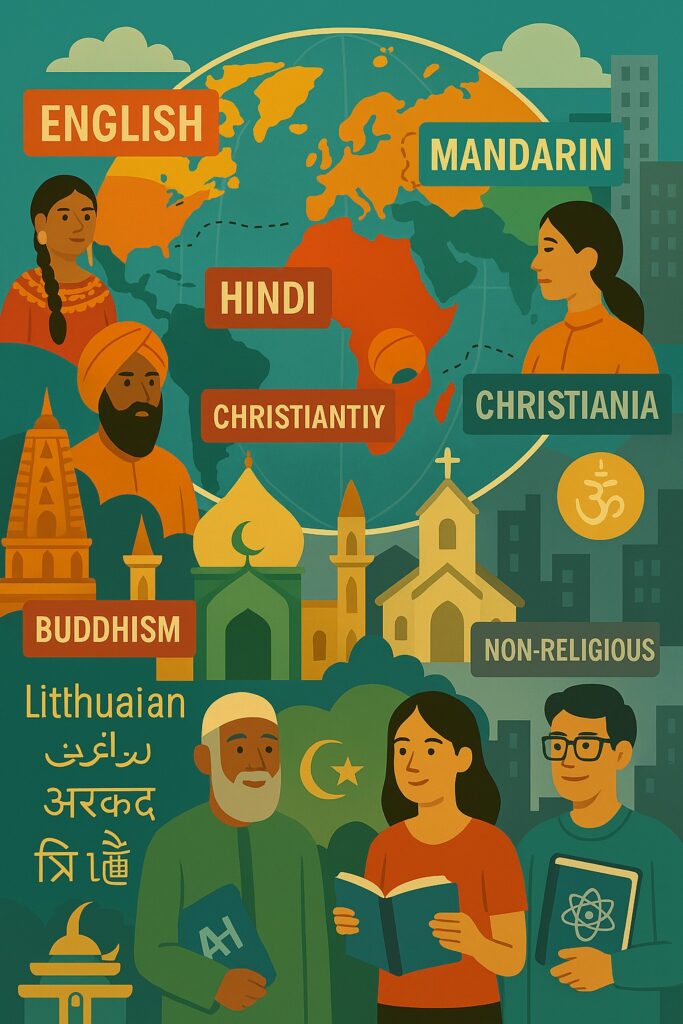Languages, religions, and secularisation are interconnected aspects of society that shape its cultural, social, and political fabric. In this article, we will discuss the relationship between languages, religions, and secularisation, exploring their influence on individuals, communities, and the broader society.

Table of Contents
Language
Languages play a vital role in shaping cultural identity and fostering a sense of belonging. They serve as vehicles for communication, preserving heritage, and transmitting knowledge across generations. Language diversity adds richness to societies, enabling people to express their thoughts, values, and emotions. However, language barriers can also lead to fragmentation and limited understanding among different linguistic groups.
Religions
Religions have a profound impact on societies, shaping beliefs, values, and moral frameworks. They provide spiritual guidance, moral codes, and rituals that foster a sense of community and purpose. Religions often play a significant role in shaping cultural practices, social norms, and political ideologies. However, religious diversity can also lead to tensions and conflicts when differences are not adequately respected and understood.
Secularisation
Secularisation refers to the process of separating religious institutions and beliefs from the functions of the state. It advocates for a neutral and inclusive public sphere that accommodates diverse religious and non-religious perspectives. Secularisation promotes individual freedom of conscience and ensures that state policies are based on rational and democratic principles rather than religious dogma. However, the extent and nature of secularisation vary across different societies.
Balancing Religious Freedom and State Neutrality
Balancing religious freedom and state neutrality is a complex task. While secularisation aims to protect individual liberties, it also recognizes the importance of accommodating religious diversity and allowing individuals to freely practice their faith. Striking a balance involves creating a legal framework that safeguards religious freedoms while ensuring the state remains impartial and avoids favoring any particular religion.
Challenges and Opportunities
The interplay between languages, religions, and secularisation presents both challenges and opportunities for societies:
- Linguistic and religious conflicts: Language and religious differences can lead to tensions, discrimination, and conflicts. Building understanding, promoting dialogue, and fostering respect for diversity are crucial for peaceful coexistence.
- Cultural exchange and enrichment: Language and religious diversity can foster cultural exchange, mutual understanding, and enrichment. Embracing linguistic and religious pluralism encourages social cohesion and a more inclusive society.
- Education and awareness: Education plays a vital role in promoting language diversity, religious tolerance, and secular values. Educating individuals about different languages, religions, and the principles of secularisation can foster respect and appreciation for diversity.
- Policy-making and governance: Governments have a responsibility to enact policies that ensure the protection of linguistic and religious rights while upholding the principles of secularisation. This includes promoting multilingualism, accommodating religious practices within reasonable limits, and safeguarding individual freedoms.
Conclusion
Languages, religions, and secularisation are integral elements of society, influencing identity, culture, and governance. Understanding the interplay between these aspects is crucial for fostering harmony, respect, and inclusivity within diverse communities. By promoting linguistic diversity, religious tolerance, and the principles of secularisation, societies can strive for a balanced and harmonious coexistence that upholds individual rights and the common good.
Read: Geography Notes